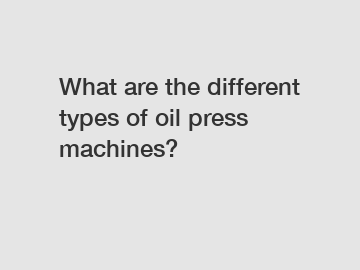Feb. 02, 2024
Machinery
What are the different types of oil press machines?
An oil press machine is a mechanical device used to extract oil from various oilseeds or commodities such as peanuts, sunflower seeds, soybeans, and coconuts. These machines are crucial in the agricultural and food processing industries, as they play a vital role in extracting oils for culinary, industrial, and medicinal purposes. There are several different types of oil press machines available on the market today, each designed for specific purposes and offering unique features. In this article, we will explore these various types of machines and their functionalities.
1. Screw Presses.

Screw presses are among the most common and widely used oil press machines. They consist of a horizontal screw shaft and a barrel-shaped cage where the oilseeds are fed. As the screw rotates, it pushes the seeds towards the cage, causing friction and pressure. This mechanical process extracts the oil from the seeds, which then flows out through small openings in the cage. Screw presses are versatile and suitable for processing a wide range of oilseeds.
2. Hydraulic Presses.
Hydraulic oil press machines use hydraulic cylinders to generate pressure. The seeds or nuts are placed in a cylindrical barrel, and hydraulic pressure is applied to compress them. This pressure ruptures the oil cells, allowing oil to flow out. Hydraulic presses are known for their high oil yield and efficient extraction process. They are commonly used for extracting oils from sesame seeds, cocoa beans, and walnuts.
3. Cold Presses.
Cold press machines are specifically designed to extract oil from oilseeds at low temperatures, typically below 60 degrees Celsius. The low temperature helps preserve the nutritional value and flavor of the oil, making it suitable for culinary applications. Cold pressing avoids high heat, chemicals, and solvents, resulting in a more natural and healthier oil. These machines are commonly used for extracting oils from olive, coconut, and avocado.
4. Expeller Presses.
Expeller press machines operate by applying mechanical pressure to extract oil. They consist of a rotating screw shaft within a cylindrical barrel. The oilseeds are fed into the machine and pushed along the barrel by the rotating screw. As the seeds pass through a narrow gap, the pressure increases, forcing the oil out. Expeller presses are efficient and widely used for producing vegetable oils from a variety of oilseeds.
5. Solvent Extraction Machines.
Solvent extraction machines are used to extract oil from oilseeds using a solvent, typically hexane. The oilseeds are first crushed or flaked, and then soaked in the solvent to dissolve the oil. The resulting mixture is then filtered to separate the oil from the solvent. This method is suitable for oilseeds with low oil content and ensures a high yield. However, the use of solvents makes it necessary to remove them from the extracted oil through a refining process.
In conclusion, the world of oil press machines offers a range of options suitable for diverse requirements. Screw presses, hydraulic presses, cold presses, expeller presses, and solvent extraction machines are all valuable tools in the oil extraction process. Understanding the differences between these types of machines allows industries and individuals to choose the most appropriate technology for their specific needs. By utilizing the right oil press machine, higher oil yields and better quality oils can be achieved.
If you are interested in purchasing an oil press machine or have any questions, please do not hesitate to contact us. Our team of experts is always ready to assist you in finding the perfect solution for your oil extraction needs. Contact us today!
Contact us to discuss your requirements of sunflower oil extraction machine , China roller roasting machine manufacturer, Rapeseed peanut soybean screw oil press. Our experienced sales team can help you identify the options that best suit your needs.
If you are interested in sending in a Guest Blogger Submission,welcome to write for us!
All Comments ( 0 )